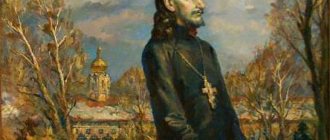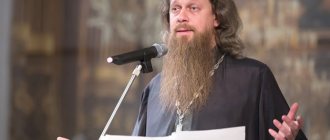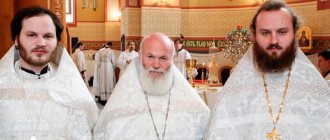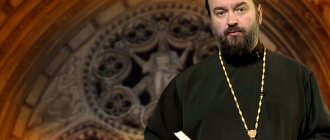Some church leaders are known and respected by the congregation. But there are those who have a special burden on their shoulders. These people speak on behalf of the church to a large audience, attracting special attention. Such individuals include Abbot Nektary Morozov. His spiritual books are read by people striving for God. The word of this person opens hearts and fills them with light. Hegumen Nektary Morozov speaks and writes simply and clearly. The biography of this man does not shine with special events; he spends all the strength of his soul on his parishioners. Let's take a closer look at his work.
Hegumen Nektary Morozov: short biography
Rodion Sergeevich was born (in the world) on June 1, 1972. His family then lived in the capital of Russia. He graduated from school there and entered Moscow State University. The young man chose the profession of a journalist, which now allows him to change people’s destinies with his words. During his studies, he was published in Obshchaya Gazeta and wrote articles for the weekly Argumenty i Fakty. Took part in business trips to hot spots. Life in the country at that time was difficult and unpredictable. The pain of other people, the injustice from which they suffered, influenced the brave young man and pushed him to the temple. In 1996, he became a member of the brethren of the Metochion of the Trinity-Sergius Lavra in Moscow. Here he took monastic vows, three years later. In 2000 he was elevated to the rank of hieromonk. And six years later he became abbot. Around the same time, he was appointed editor-in-chief of the journal Orthodoxy and Modernity. Hegumen Nektary (Morozov) is known to the general public through articles and books.
The path of an Orthodox journalist
Currently heading the publication “Orthodoxy and Modernity” as editor, being dean and president of the foundation under the same name, Father Nektary teaches at the Saratov Theological Seminary and heads the Orthodox military-patriotic organization “Patriot”.
Father Nektary is the rector of the Peter and Paul Church in Saratov
During his short journey as a priest, Father Morozov served in Saratov as rector of the Church of the Icon of the Virgin Mary “Quench My Sorrows”, the Church of St. Nicholas of Japan and Peter and Paul Church.
Chechen business trip
The young man found himself in a hot spot in 1995. The journey was not easy. Subsequently, the future abbot Nektary (Morozov) wrote about this business trip. She turned his soul upside down. Then all channels showed a temple in Grozny, in which people were hiding from bombs. Rodion wanted to see this place. His companions agreed to deviate from the route. They found the temple burnt. However, at its ruins there were living people who surrounded the local priest Anatoly Chistousov. Then Rodion Morozov (Nectarius, now hegumen) for the first time realized what his flock had for the abbot. People were with the priest, like sheep with a shepherd. They consulted, asked what to do and how to act in this or that case. The priest's eyes were filled with love and pain. They expressed meekness and strength at the same time. This man accepted everything that happened with humility, thinking only about his flock and the salvation of the souls of these people. He was subsequently captured, tortured for a long time and killed.
In the first half of his biography, Abbot Nektariy was a journalist
June 1, 1972
Nektary Morozov's birthday
The biography of Abbot Nektary Morozov has always revolved around journalism. Unless in childhood he was a simple child from a metropolitan family - little Rodion Sergeevich Morozov.
He was born on June 1, 1972, grew up, read, looked at the world and gradually came to the idea that he wanted to become a journalist.
In the photo - Hegumen Nektary Morozov
This profession attracted him. The power of words can change a person’s destiny—there was something magical about that.
Already during his studies, Rodion Sergeevich began to try his hand at his chosen direction. Wrote materials for several publications, including:
- "General newspaper";
- "Arguments and Facts".
The profession required more and more dedication, I had to go on business trips. Rodion Sergeevich had to not only see and describe important events for his era, but emotionally experience them. The times were turbulent - journalists had to visit hot spots.
Hegumen Nektary Morozov: books
It is not easy for an ordinary person to come to church. And staying there is even more difficult. Hegumen Nektary (Morozov) understands this very well. And the point is not that people lack faith. Many people are afraid of “strict rules” and incomprehensible ceremonies. This is a natural reaction to the unknown. Abbot Nektary aims his books precisely at such an audience. They contain simple and understandable discussions about the meaning of church life, its naturalness for a believer. The reader feels how they gently take him by the hand and lead him to the temple, talking about the canons, explaining incomprehensible points. After reading the texts, a person feels much easier and freer in church. It is necessary to note the easy style of presentation. From the first word you get the impression of a leisurely conversation with a wise friend who understands you. Here are some of the author's works:
- "Looking forward to meeting you."
- “What prevents us from being with God.”
- "Teaching on reading spiritual books."
- “About bread and water in the life of the Church.”
- "Conversations about churching."
- “On the way to God. The experience of churching in the modern world."
Hegumen Nektary (Morozov). A little about psychology - patristic and modern
Today, very often among church people one comes across a contrast between the practice of modern psychology (even Christian) and the experience of the holy fathers of antiquity. And, unfortunately, we have to admit: psychology often wins in this battle on the field of human hearts. I’ll say right away: I have nothing against psychology, I’m seriously interested in it, I even received additional psychological education. But I perceive it in relation to Christian life exclusively as a means at hand, as something that, with the right approach, can bring significant benefit, but with the wrong approach can cause serious harm.
The correct approach, from my point of view, is to gratefully use the rich material that has been accumulated by psychologists, to thoughtfully analyze the mechanisms and examples of helping people who are traumatized, dependent and codependent, to observe how a person changes over time, how they influence various external factors that were absent in our life earlier, on the psyche, nervous system and on what we usually call the internal structure. And, of course, at the same time, we look at everything that psychology offers us through the prism of Christianity, accepting what serves our main goal and rejecting what leads us away from this goal.
There are many schools and areas of psychology, not to mention the fact that each practicing specialist, in addition to this, is the owner of his own life and professional experience, certain moral and value guidelines, and can be either a believer or an outright atheist. Psychology sets itself the task of helping a person - in the same way that help is understood by this or that school, this or that psychologist. And in some cases, this task is solved by means that do not in any way contradict the Gospel and, perhaps, even prepare a person to accept and understand the essence of Christ’s commandments; but in others the contradiction is completely obvious, so that, by and large, we can talk about a choice: either “this” psychology or Christianity cannot be combined.
There is a wonderful example from the Monk Abba Dorotheos, illustrating these techniques of working on oneself that are incompatible with Christianity.
The monk was a very attentive, thoughtful man, constantly learning, trying to derive spiritual benefit from everything he encountered. He, as we would say now, was an excellent Christian psychologist and researcher of human souls, first of all, his own soul. And then one day he saw one brother who was constantly subjected to insults and humiliation from the other inhabitants of the monastery, serving as an object of ridicule and annoyance for them. And at the same time he always maintained amazing calm and serenity.
Of course, Abba Dorotheos became interested in this and, as a person striving to learn spiritual wisdom, asked his brother what thought allowed him to maintain peace in the face of such constant temptations.
“Should I pay attention to their shortcomings or accept insults from them as people? These are barking dogs,” he replied.
“Hearing this,” says the monk, “I bowed my head and said to myself: “This brother has found the way,” and, crossing himself, moved away from him, praying to God to cover me and him.”
Therefore, it is natural that not every psychological method or technique can be acceptable for us - if, of course, we first of all consider ourselves Christians, that is, disciples of Christ, and want to be with Christ. This seems completely obvious, but... But, as I mentioned above, these days, even seemingly quite church people often prefer psychology to patristic asceticism, and psychoanalysis with Gestalt therapy turn out to be much closer, more accessible and understandable for them than “The Ladder” "or "Invisible abuse."
It seems to me that there are at least two main reasons for this. Firstly, there is a certain confusion of goals and concepts. What are we really striving for? To solve internal problems, to improve relationships at home and at work, to career success and “self-development”? Or are we looking for a genuine, real life with God, the very one that is the Kingdom of God, which is revealed to us still here on earth? In the first case, psychology can definitely help us, but in the second... Unfortunately, or fortunately, neither Freud, nor Jung, nor Adler could lead anyone to the Kingdom of Heaven: they did not know not only the path to it, but also in principle, they knew little about him. And the fathers... The ascetic fathers themselves have walked this path and can lead us along it, if only we are ready to listen to them and learn from them.
Secondly, it seems to me that most modern Christians of the Holy Fathers... are afraid. Yes, that’s right, and I face this fear literally day after day. Fear is born from the feeling that right now the holy mentors are demanding from us not just changes in our way of thinking and life, but also feats that exceed our physical and mental strength. From the feeling that we are under their close supervision and they will strictly judge any of our weaknesses, any deviation from the strictest ascetic life. From the feeling, finally, that by reading their advice and instructions, we are once and for all deprived of the right to consolation, to compassion, to any personal plans or interests. Sounds wonderful? But in fact, very often this is the case.
I believe that this interpretation of the patristic works is explained quite simply: today there are few people who know how to thoughtfully read the text (not to mention read between the lines), the majority pay attention exclusively to what stands out especially brightly and clearly. And these, as a rule, are stories about supernatural feats, about complete ruthlessness towards oneself, about an unprecedentedly harsh life, full of hardships and hard work. But there is, without a doubt, something that may not be so striking, but for us in our current state is much more important: this is, relatively speaking, diverse evidence that the staircase leading to heaven begins here on earth , and its first step is level with this very ground, so starting the ascent is not at all difficult - it’s not even work, but just a decision.
I will give just a few examples of this kind - in fact, they are countless.
How did Saint Theophan the Recluse advise determining the number of bows for his cell rule? “Put as many bows as necessary so that your body gets tired”... And then... “Take a certain amount from it and make a rule for yourself from the rest.” This is precisely about gradualism, about measure, about feasible feat.
Abba Isaac the Syrian, the strictest ascetic, formulates the principle of “doing what is possible”:
“If you are not silent in your heart, at least be silent in your tongue. If you cannot keep your thoughts in order, then at least make your feelings well-ordered. If you are not alone in your thoughts, then be alone in your body. If you cannot labor with your body, grieve at least mentally. If you cannot stay awake while standing, then stay awake while sitting or lying on your bed. If you cannot fast for two days, fast at least until the evening. And if you cannot until the evening, then beware of satiety. If you are not blameless in your heart, then be blameless in your body. If you do not weep in your heart, then at least clothe your face with weeping. If you cannot have mercy, then say that you are a sinner. If you are not a peacemaker, then at least do not be a lover of rebellion.
If you cannot become zealous, at least in your way of thinking, be not like a lazy one. If you are not a winner, then do not be proud of yourself in front of your subordinates. If you are not able to stop the mouth of someone who condemns your friend, then at least beware of entering into communication with him.”
That is, if you cannot do great things, then start small, do not neglect what is possible for you, this is the main thing, this is the foundation on which everything is based.
And here is the amazing advice of the Monk Barsanuphius the Great to the abbot of the monastery, Abba Serid, when he decided to change the rules of the hostel towards greater severity:
"My son! And I say to you and to brother John: before this it was already written to you about long-suffering, and now I will repeat: churn the milk, and there will be butter; if you squeeze your hand on the nipple, blood will come out (Proverbs 30:33). And the holy Apostle Paul also says: I became a Jew as a Jew, that I might gain Jews, and so on. (1 Cor. 9:20). And below he says: I will give everything to everyone, so that I will save everyone (1 Cor. 9:22). If someone wants to bend a tree or a vine like a hoop, then he bends it gradually, and they do not break; if it bends suddenly and strongly, then (the tree) immediately breaks. Understand what I say."
He also remarkably resolves the question of what to do when a person persistently asks you for something that you cannot do without, convincing the hermit that he can boldly answer: he does not have what he asks for - after all, he really does not exist for that. to give, to eat - only to use it yourself.
And another most important instruction belongs to him:
“If you see someone fallen into a hole and asks for help, do not extend your hand to him - give him a staff. If he wants to get out, you will help him; if, on the contrary, he drags you towards him, just let go of the staff. And if you give him your hand, he will easily pull you into the pit.”
Who will say that these tips are not applicable to our lives, that they are not full of condescension towards human weakness and imperfection, that they do not show the deepest knowledge... of psychology?
I am sure that anyone who truly, not only theoretically, but also experimentally becomes acquainted with the amazing knowledge of the human soul that we find in the Holy Fathers, will not get lost in the jungle of the diversity of modern psychology. And he will be able to find in it something that, without a doubt, will benefit him and will serve as an aid in his daily work on himself. And in the same way he will be able to cut off what is superfluous, which is not compatible with the life of the Gospel.
Hegumen Nektary (Morozov) Pravoslavie.ru September 9, 2020
"The Work of Awakening"
Why should we go to God? How to do it? Abbot Nektariy answers these questions in his book “The Work of Awakening.” This is a meditation based on passages from the New Testament. A person needs to make a decision that he completely trusts the Creator. But this alone is not enough. Faith is only the first step. The spiritual development of personality consists of daily work to overcome one’s own indecision and relaxation. The author in his reflections relies on examples from the New Testament. He pays a lot of attention to discussions about who we are fighting with, opening up to the Creator. This entity is cunning and evil, it has great experience and knowledge. Only those who have opened their souls to the Creator and have completely trusted him can overcome the placed nets. And Abbot Nektary recommends taking your conscience as a companion in this work. She vigilantly protects a person throughout life, trying to suggest the right decisions and actions.
Orthodox Life
What is it like to live “well”?
As a priest, I can testify that quite often believers - those people with whom I happen to communicate in church - find the question of the meaning of life unresolved for themselves. They may not ask anything about this, but from what a person says, what he talks about himself, it becomes absolutely clear that he has not found this meaning in life for himself. It seems that the speaker understands that someday this temporary life will end and there will be eternal life, but this understanding does not give rise to something in him that would permeate and organize his entire existence here.
Why does this happen? Not least because the very presence of meaning in our lives today seems optional. People who grew up in the Soviet era wrote essays about the meaning of life in school, and thought about why a person lives in literature lessons. Another thing is that the answer to this question was offered far from perfect, not true, limited by non-church consciousness, but, nevertheless, the main thing was learned: since there is life, it means it must have meaning, and everyone must find it, otherwise all of it existence in the world will be in vain.
Probably, children who study today, somewhere from some teachers, write essays on similar topics, but most often their ideas boil down to the fact that life should be lived as well as possible. What is this “good”? And it turns out that there are problems with understanding this. For one person, “good” is when there is nothing to be ashamed of, for another it is a certain set of positive emotions, for a third it is the opportunity to certainly realize what he strives for... In a word, today there are an order of magnitude fewer people trying to comprehend their existence than even two or three decades ago. And since society and the Church are communicating vessels, then among church people many follow the same already established inertia and cannot truly comprehend their existence in the Church, their existence in this world as Christians.
Of course, there are people who have some specific earthly idea of why they live. They say that the meaning of life for them is to be decent, to do as much good as possible to other people, to raise their children with dignity, and to leave a good memory of themselves. But we all know well how it happens: very often a person tries to do good, but little comes of it. Someone dreams of a family and sees it as a justification for their existence, but the Lord either does not give him children or does not give him marriage as such. Someone fails to realize himself in a profession, make a discovery, or do something else that he considers his mission on earth. All these meanings that people focus on turn out to be imperfect and do not stand the test of life. In this case, a person either becomes completely disappointed and believes that there is no meaning at all, or he turns to God.
Dazed from birth
As for believers, most of them answer the question: what is the meaning of life? - they will answer: of course, in salvation. It seems that formally this is the case, but is every person who says that the meaning of life lies in achieving salvation really satisfied in his life only with what leads him to salvation? After all, it often happens like this: a person believes that his life is built in accordance with a certain meaning, but reality refutes this. I remember that Archimandrite Cherubim (Karambelas) in his “Nostalgic Notes from the Lot of the Mother of God” spoke about an elder who, every time he met one of the brethren, asked with pain and hope: “What do you think: will we be saved?” And nothing else interested him. Yes, for him the meaning of life was definitely salvation, but can the same be said about each of us?..
Why does this happen? Personally, it seems to me that most people are in some kind of dazed state from the moment they are born. It seems that a person, as soon as he was born, was put on an unbroken horse, and now it gallops somewhere, carries it somewhere, and the person clung to it with a death grip and, as he grows up, realizes only one task - not to fall off. And he believes that this is the full fulfillment of his life.
In fact, we cannot give ourselves up to this rush - the processes taking place in life can and should be taken, to the extent within our power, under control. Of course, a person’s life cannot be completely controlled by him, since he received it as a gift, it was given to him for a while. But at the same time, it is very important for a person to understand: in addition to the general meaning - being with God here on earth and in eternity - there is God’s plan for him specifically, and in accordance with this, his life should take on one direction or another.
Our common cause with God
Why does our heart sometimes not feel this private meaning of our own life? Mainly for one reason: in order to begin to understand what God's will is specifically for us, we need to truly devote our lives to God. Moreover, a person will receive the final answer to the question of his destiny only when his earthly life is over: all of it will, in fact, be a search for an answer. But this search can be interesting, creative, and, by and large, it fills life with meaning, because in such a search a person finds himself inseparably connected with God, and, thus, the most important and general meaning is already realized in his life. And the private meaning is embodied when we understand what the Lord wants from us in certain circumstances, and we follow it.
The key to living our earthly life correctly is to feel it as our common cause with God. This path - to be a co-worker of God - is open to every person, and first of all, this cooperation with God must manifest itself in us in relation to ourselves. The Lord is ready to work to perfect a person, to bring him to the highest spiritual state, and therefore we can say that the meaning of our life, its goal is to do the maximum in our power so that the Lord can do with us everything that He does with us. he decided to do it to us, and we could accept it without any restrictions. And all our work consists in preparing ourselves for this acceptance and at the right moment being capable of it.
And how it happens... You know, many holy fathers have the idea that the hand of a person accepting gifts from God is humility. And the less humility, the smaller the handful into which a person can contain the gifts of God. Why am I saying this? Moreover, almost no one escapes situations in their spiritual life when it seems: that’s it, you’ve reached some kind of dead end, you can’t move anywhere further, and your whole Christian life has become meaningless. You need to understand that such “meaninglessness” happens precisely from pride, from a lack of humility. The Lord is gradually narrowing the gates through which we pass, and in order to squeeze further, we need to cut off some growths that we mistakenly consider part of ourselves. And if a person feels that he is “stuck,” it means that the time has come to give up something. Perhaps at the moment this refusal is very painful for us, but later, looking back at what we left behind, we will see that it made our life harder, only made it worse, and there is nothing good about it. You should not deceive yourself that you can take some other path: every person has only one road - the one along which the Lord leads him. And if a person at some point refuses to go, he will not be able to move anywhere until he overcomes this obstacle within himself. This is not actually a dead end - it is a stop on the way, by prolonging which a person can no longer realize the main meaning of his life.
What to do in this situation? It seems to me that you need to think something like this: “What is happening to me now is not just an obstacle that I have stopped at, it is not just my personal drama, but this is my common cause with God. And if I can’t do something now, if I got up here or even lay down and continue to lie down, then the Lord still wants to continue my movement. And if I have at least the minimum readiness for this, even the smallest ability to ask God for this, then the Lord will definitely drag me through this narrow door. Maybe it will be very painful for me, maybe it will be very difficult for me - if I walked on my own, it would hurt less - but I have only one road, and I am ready to endure this pain.” And if we really have the readiness, if we say this sincerely, the Lord will really pull us and we will get out of this state and continue our path.
Hegumen Nektary (Morozov)
Pravoslavie.ru
“About the Church without prejudice. Conversations with a secular journalist"
A very interesting collection that reveals many topics that concern ordinary people far from the temple. Hegumen Nektary does not shy away from pressing questions, he explains everything sincerely and naturally. Much attention is paid to the problems of the church, myths and stereotypes surrounding its ministers. The author talks about what a temple is like “from the inside”, what the life of a priest consists of. The conversations also touch on more serious issues. For example, the responsibility of the clergyman to the flock is revealed. The abbot also answers the journalist’s slippery questions. Together they are trying to figure out why the church is alienating ordinary citizens, what needs to be done to overcome mistrust. Some of the conversations are devoted to current events in the world. The abbot gives advice to the concerned reader on how to relate to negative information broadcast by the media.
About sorrows
It is not only traditions that scare modern people away from the temple. People believe that believers are in constant despondency. Hegumen Nektariy spoke about sorrows in interviews and articles. According to him, the reason for the misunderstanding lies in different attitudes to what is happening. An ordinary person, without the Lord in his soul, believes that trouble is due to someone else’s fault. This poor fellow recklessly appoints someone responsible for his failures or mistakes, and then he will take revenge. The believer understands that sorrows come due to distance from the Lord. This is the result of his disobedience to the Heavenly Father. The cause of sorrows is in the human soul. The believer seeks them in his actions and decisions. And like a devoted son he asks the Lord to help cope with them.
Father Nektary became a priest and used his journalistic skills for the benefit of the Orthodox Church
The priest from the destroyed temple made such a strong impression on Rodion Sergeevich that he reconsidered his priorities and decided to serve the Lord himself. In 1997, the journalist entered the Moscow Theological Seminary, where he studied until 2001
In April 1999, Rodion Sergeevich went even further and became a monk. He was given the name Nektarios - in honor of St. Aegina, bishop of the Alexandrian Orthodox Church.
Ortal of the Saratov and Volsk Diocese
Soon Father Nektary was ordained as a hierodeacon. In March 2000 he was already a hieromonk. The skills of a journalist came in handy in the ministry:
- Since 2003, Father Nektary headed the information and publishing department of the Saratov diocese for seven years;
- He still works as editor of the journal Orthodoxy and Modernity.
About psychics
The author also has sharp articles devoted to the state structure. One of them is called “Love for Psychics.” In this article, the abbot tries to understand why society and the authorities do not find understanding. Why do people rely on anything other than officials? Finding the answers is not as difficult as it seems. The consumer society makes a person demanding and lazy. His soul sleeps, not understanding what responsibility is. He gladly shifts his mistakes and blunders onto officials, especially since a stream of information flows at him from the screens, supporting such misconceptions. It turns out that the government itself creates irresponsible consumers through its actions. The vicious circle can only be broken by raising the spirituality of people.
What makes a priest tired?
This material reveals the essence of the priest’s work. Hegumen Nektariy took upon himself the thankless task of debunking the myths that clergy are parasites on the necks of their flock. He reveals in some detail the essence of the work in the temple. But it is far from being as simple as it seems from the outside. The main concern of a shepherd is people. He is obliged to take care of them, listen to them, support them, and the like. However, a short conversation cannot awaken a person’s soul. But this is precisely the main task of the shepherd. He is not obliged to live for the parishioners. His goal is to show them the way to the Lord. You have to do this not only by your own example. There is a lot of anger, suspicion, arrogance and similar negative emotions in people now. And the shepherd is obliged to turn them into love, in any case, to do everything possible for this.
Why does Abbot Nektary need such work?
Each person has his own tasks. By the way, they do not depend on birth, as psychics and fortune tellers tell us, but on spiritual development. A believer cannot calmly watch as his neighbors “wander toward death” through a series of despondency, stress, anger, and the like. But when the soul sleeps, a person lives only half, only with his body, says Nectarius (abbot). Who is he to teach others? The reader is probably asking this question. The answer is simple: he is a deeply religious person, which means he loves everyone on this earth. This is so natural for Christianity: help your neighbor without asking for anything in return. What could be more joyful than happiness in the eyes of another person? For the shepherd, probably, only the understanding that he helped save his soul.
People need the temple like air. However, not everyone is able to independently come to faith and work for their own spiritual growth. Hegumen Nektariy understands that you need to extend a helping hand, they will definitely grab it. And this person does not look around, trying to figure out who is doing what. He sees a problem and immediately tries to solve it. His literary talent allows him to talk about important things in an accessible and simple way. This is what he does, for which many readers are grateful to this man. Unfortunately, not all church officials are so outspoken. Sometimes believers find themselves in a situation where there is simply nowhere to find answers to the painful questions of the soul. And Abbot Nektary talks about them precisely in order to reach everyone in need of help.











